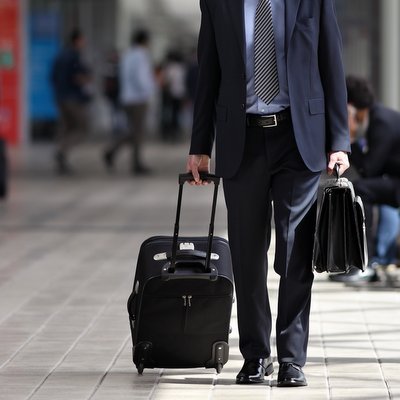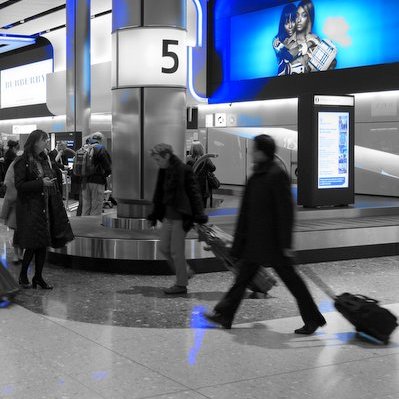7 Tips to Overcome the Nail-Biting Fear Of Getting On A Plane
Firstly you are not alone; few people will admit to having aerophobia and statistics say that 6.5% of travellers have a fear of flying to some degree. Yes, the fear of flying has a name, which always legitimises a "phobia". According to Wikipedia, "A phobia is a type of anxiety disorder, usually defined as a persistent fear of an object or situation in which the sufferer commits to great lengths in avoiding, typically disproportional to the actual danger posed, often being recognised as irrational."
So who says what is "irrational" compared to us just being individuals? I hate spiders with a passion and actually can have a mild panic attack if faced with one; it has to be a big one though. Most people on the planet have a hang up of some sort or another. We are all special in that way. On the other hand I adore being on a plane of any sort, as it is a moment in time when I have said goodbye to where I have been and I am excited about where I am going. It is a bit like fishing, as you don't have to do anything but sit and wait with a wonderful sense of expectation.
1. Understand your own psyche.
Prior to the flight sit in comfortable surroundings, with or without a drink in hand, and write down exactly what triggers your anxiety levels to explode. Is it the actually stepping onto a plane where you have no control over what happens thereafter, is it being cramped like a sardine into economy where your personal space is invaded, maybe it is when the plane takes off or is landing? Whatever it is, write it down and then look at it from a realistic point of view and how you can alleviate the cause. Such as when the plane is taking off or landing, totally distract yourself by talking to your fellow passenger, especially if they are good looking. Maybe bury your head in an absorbing book, or shut your eyes and take yourself to your warm and fuzzy thoughts. The postage stamp size economy is the easiest one, fly business or first class and have more room around you. Best of all, talk to someone that loves flying about your anxiety trigger list.
2. Learn about planes in general.
Knowledge is power and if you learn a bit about what type of plane you will be flying on, then you will be able to explain to yourself in your own head any bumps, noises or air turbulent motions that you may experience and how planes are built to handle such things. Develop your own mantra such as, "I am safe, I am secure".
3. Separate reality from imagined danger.
The chances of dying in a plane crash are one in 11 million. You have more chance of dying in a car accident either at home or at your destination, especially if you plan on driving in the world's worst place for motor vehicle accidents, Afghanistan. Your body actually reacts the same way to anxiety as it does to danger. Feeling anxious does not spell imminent danger, it is all in your head and not based in reality. Keep telling yourself that fact.
4. Think warm and fuzzy thoughts.
You know the type, warm bear hugs from someone you love, lying on a sunny beach in paradise somewhere, or have your favourite cuddly toy shoved under your jacket that no one needs to know about. Ooops, sorry the guys at security might throw off at you, but you can always say your child forgot it. Picture in your mind anything that makes you feel safe and cozy, that is short of sucking your thumb, which is never a good look in public. Put your fantasy cap on and think about where you are going and how exciting it is going to be.
5. Build your own cocoon.
Nestle in and get totally comfy in your seat, well as comfortable as is possible if you are in economy. Even keep your hat on if it makes you feel good. Hopefully you do not have a nightmare person beside you and you can even strike up a bit of general banter about how you hate planes. Or shut your eyes with your MP3 earplugs in and some favourite music on, and a stress ball that you can squeeze the hell out of. When in flight mode, make sure the window blind is down so you can't see that you are above the white wispy and fluffy clouds of the "Care Bear" variety. You might eventually learn to like the game of "what shape does that cloud resemble", as I do.
6. Fly as much as you can.
Don't avoid flying; jump on a plane as often as you can, to overcome your fear. For every flight you have, the next one will get easier. Think of it as a mental challenge like brain aerobics. You are teaching your inner self a new way of walking a parallel beam without falling off, one step at a time.
7. Develop a Zen attitude.
Go and do some yoga, it will be good for you anyway in your everyday life, just don't expect to be able to do the "firefly" pose in the middle of the aisle during takeoff. There won't be enough room! But it will teach you how to calm your mind and have a "Zen" attitude. It will also teach you to have positive thoughts and a more balanced way of looking or approaching things that would normally stress you out.
Learn how to surrender, to let go of your own sense of self-control so that positive thoughts and powerful endorphins can light up those brainwaves to banish any fear inducing flying bogeyman thoughts.
The extra bit of advise will provide is these 6 movies NOT to watch before getting on a plane.
Gail Palethorpe, a self proclaimed Australian gypsy, is a freelance writer, photographer and eternal traveller. Check out her website GailPalethorpePhotography.com.
Further Reading
There are many people who are absolutely terrified of flying in an airplane. From neighbours and friends to celebrities like Whoopie Goldberg, most people know someone with an intense aversion to being on a plane. While this is a common fear, it is questionable whether it is rational or irrational. Fear of flying effects a wide variety of people, and those without this condition are left to wonder what the possible causes are for this widespread fear. Even those who are suffering from the fear of flight may not have considered the root of their own fears.
In this fear of flying article these topics are approached with the curiosity for what factors in a person's history or what environmental triggers lead to such a large group of the flight-phobic. This interesting article also covers why the fear of flying may not be founded in reality and real statistics. Exploring the topic of fear of flying through a psychological perspective brings great new insights into this condition, and can perhaps lead to a long term solution that does not result in substance abuse or other harmful coping methods.















